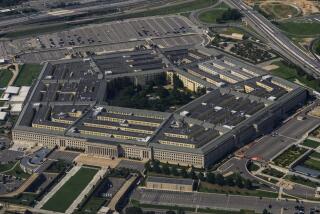Meese Signs Independent Counsel Rule for Congress
- Share via
WASHINGTON — Edwin Meese III, whose 3 1/2-year tenure as attorney general was marred by an independent counsel’s probe of his affairs, signed as his final act Friday an order for similar special prosecutors to investigate members of Congress suspected of criminal conduct.
Meese said he acted on his last day as head of the Justice Department to ensure that legislators and top executive branch officials be treated equally under the law.
“Having all high officials covered by the same general procedures makes good sense,” he told reporters. Since Meese came to Washington in 1981 as counselor to President Reagan, two separate independent counsels have scrutinized his financial dealings.
Meese said the order means that senators and House members will be treated similarly to the top executive branch officials covered by the Ethics In Government Act of 1978.
Asked if his act was a parting shot at his critics in Congress, Meese replied: “No, not at all.” No one currently under investigation will be subject to the order’s provisions, he said.
Meese said his authority to impose the rule derived from the attorney general’s power to appoint special prosecutors, as was done in the Watergate scandal.
He said he waited to sign the order until his successor, former Pennsylvania Gov. Richard L. Thornburgh, was approved by the Senate on Thursday so as not to cause Thornburgh any problems at his confirmation hearings.
Meese said he discussed the regulation with Thornburgh, adding, “I believe he agrees with it.” Thornburgh, who was sworn in at the White House on Friday, could rescind the rule at any time.
Under Meese’s order, if the attorney general receives specific and credible information indicating that a senator or congressman has violated criminal law, he must launch a preliminary investigation of up to 90 days to see whether a special counsel should be named to conduct a full probe.
Based on the results of the preliminary probe, the attorney general can either close the case or appoint an independent counsel to investigate.
Called Unnecessary
Rep. Barney Frank (D-Mass.), chairman of a House Judiciary subcommittee that reviews the ethics law, said Meese’s order is unnecessary because the act already allows the attorney general to call for a special prosecutor.
Rep. Peter Rodino (D-N.J.), chairman of the House Judiciary Committee, has agreed with that view. The 1978 ethics law, designed to guard against any conflict of interest by having an outside person handle investigations, does not specifically spell out that legislators are covered.
Frank said the order, signed after Congress had recessed until after Labor Day, was a “vindictive and petty act by a man who has not shown any class since he came here. . . . One last mark of irresponsible bitterness of a guy who messed up.”
Meese, however, said the rule will allay public concern that “a party in power in the White House would somehow be more lenient towards its own members of that party on the (Capitol) Hill, or that it would be more vigorous in its prosecution of the opposing party.”
Different Approaches
Procedures under Meese’s order and the ethics act will differ somewhat. For instance, Meese’s rule calls for the attorney general to appoint an independent counsel to investigate legislators; a three-judge panel selects the counsel under the ethics act.
Sen. Carl Levin (D-Mich.) contended that this difference undermines Meese’s action because the message to his successors is, “Use attorneys who are under the thumb of the attorney general instead of under the auspices of the federal court.”
Earlier in the Administration, Meese sought to have the act declared unconstitutional, but the Supreme Court upheld it last June 29. Meese said the law resulted in unequal administration of justice because normal criminal cases are handled by the Justice Department.
Meese, 56, is leaving the government to serve as a distinguished fellow at the Heritage Foundation, a conservative Washington think tank, and at the Hoover Institution at Stanford University in California. He also intends to hit the lecture circuit.
First Investigation
While at the White House, Meese was investigated by independent counsel Jacob Stein on allegations that he may have used his office for personal gain. Stein brought no charges against Meese.
More recently, independent counsel James McKay investigated Meese on allegations of conflict of interest and looked into his relationship with E. Robert Wallach, a lawyer who has been indicted in a case involving Wedtech Corp., a defense contractor in the Bronx, N.Y.
McKay said last month that prosecution of Meese was unwarranted, although the attorney general probably violated tax and conflict-of-interest laws. Meese harshly criticized McKay’s comments and said the special counsel’s report vindicated him.
At his news conference Friday, Meese said neither he nor anyone at the White House would have helped Wedtech secure government contracts had they known Wedtech was a “nest of criminals.”
“I would not have had anything to do with it,” he said.
More to Read
Sign up for Essential California
The most important California stories and recommendations in your inbox every morning.
You may occasionally receive promotional content from the Los Angeles Times.













